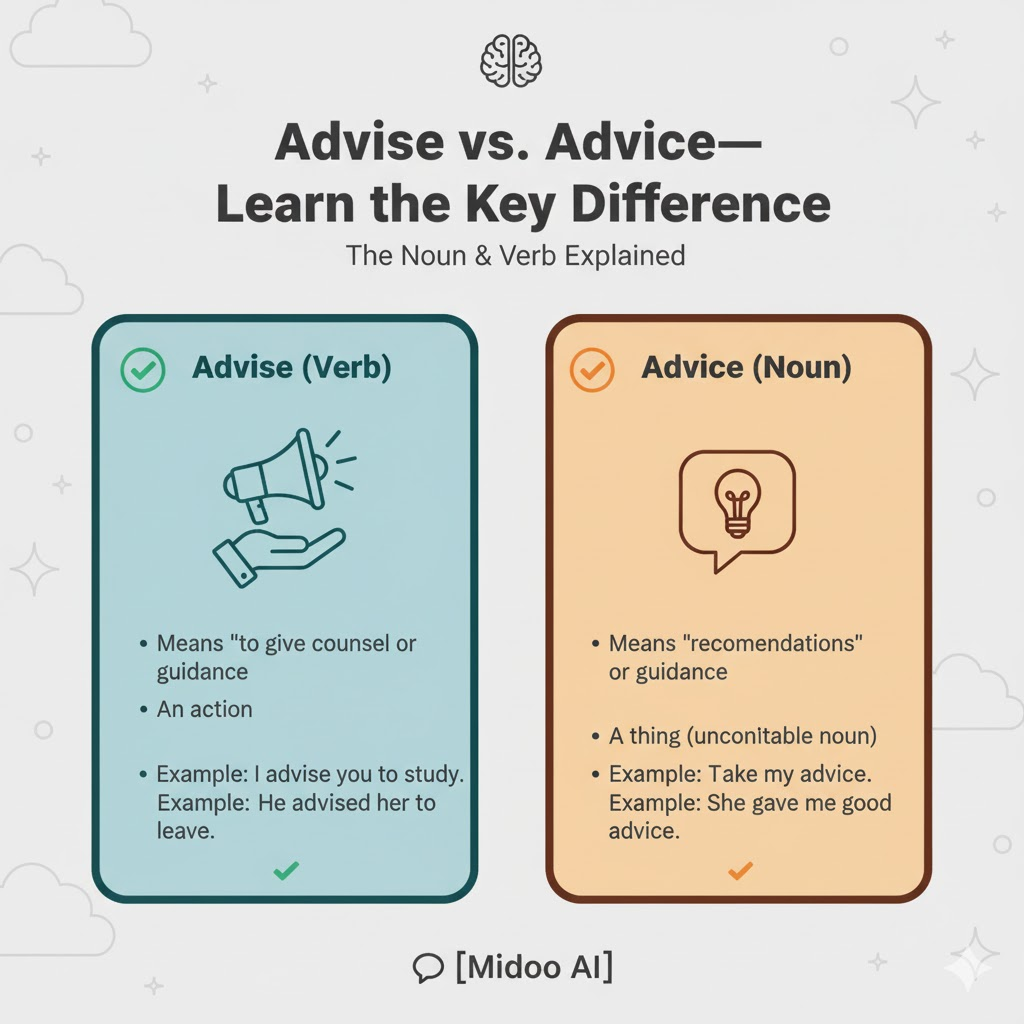Advise vs. Advice—Learn the Key Difference

English can be tricky—even for advanced learners—especially when two words look nearly identical but play completely different grammatical roles. One of the most common confusions is between advise and advice.
At Midoo AI, we know how often English learners stumble over these subtle word pairs. That’s why we’re breaking down the difference between advise and advice, so you can use them correctly and confidently in writing or speech.
1. The Core Difference
The main difference lies in their part of speech:
- Advise is a verb — it means to recommend, to give guidance, or to suggest what someone should do.
- Advice is a noun — it means a suggestion or a piece of guidance.
💡 Tip:
If you can replace the word with recommend or suggest, use advise.
If you can replace it with suggestion or guidance, use advice.
2. How to Use “Advise” (Verb)
“Advise” describes the action of giving a suggestion or guidance to someone.
Examples:
- I advise you to get more sleep before your exam.
- The doctor advised him to exercise regularly.
- My lawyer advised against signing the contract.
- Can you advise me on which course to take?
- We were advised to arrive early to avoid traffic.
💡 Tip:
“Advise” often appears before an object (someone) and an infinitive verb (“to + verb”), e.g., advise someone to do something.
3. How to Use “Advice” (Noun)
“Advice” refers to the thing being given — the suggestion itself.
Examples:
- She gave me excellent advice about studying abroad.
- His advice was to trust my instincts.
- I need some advice before making a decision.
- My father’s advice has always been helpful.
- Can I ask for your advice on this project?
💡 Tip:
“Advice” is uncountable, so you should not say an advice or advices.
✅ Correct: some advice / a piece of advice
❌ Wrong: an advice / advices
4. Quick Comparison Table
| Function | Advise | Advice |
|---|---|---|
| Part of Speech | Verb | Noun |
| Meaning | To give a suggestion or recommendation | The suggestion itself |
| Pronunciation | /ədˈvaɪz/ (ends with a “z” sound) | /ədˈvaɪs/ (ends with an “s” sound) |
| Example | She advised me to rest. | She gave me good advice. |
5. Common Mistakes to Avoid
❌ She gave me a good advise.
✅ She gave me good advice.
❌ Can you advice me on this matter?
✅ Can you advise me on this matter?
❌ My parents always give me great advises.
✅ My parents always give me great advice.
💬 Tip:
You advise someone, but you give advice. Think of it this way:
👉 “You do advise, and you give advice.”
6. Easy Memory Tricks
- 🗣️ Advise → Action → ends with se (like verbs: “use,” “raise”)
- 💡 Advice → Thing → ends with ce (like nouns: “ice,” “price”)
Another simple way to remember:
If you can do it → use “advise.”
If you can have it → use “advice.”
7. Real-Life Examples
- My teacher advised me to read every day.
- The company advised customers about the policy change.
- Her advice was simple but effective.
- I always take my mentor’s advice seriously.
- Doctors strongly advise against smoking.
- Thanks for your advice—it really helped me.
FAQS
Q1: Can “advice” ever be plural?
No. “Advice” is uncountable, so you never say advices. Instead, use pieces of advice if you need a plural meaning.
Q2: Are “advise” and “advice” pronounced differently?
Yes.
- Advise (/ədˈvaɪz/) has a “z” sound.
- Advice (/ədˈvaɪs/) has an “s” sound.
Q3: Can I say “advise to do something”?
Yes, but usually you’ll say advise someone to do something (include the person).
Example: She advised me to study harder.
Q4: Is “advise” formal?
It can be used in both formal and informal contexts. For professional or business writing, “advise” is often preferred over “suggest.”
Q5: What are common collocations with “advice”?
- take advice
- give advice
- seek advice
- follow advice